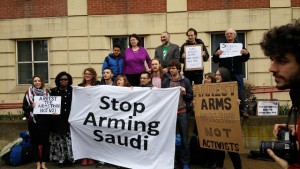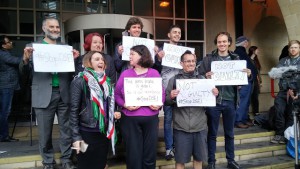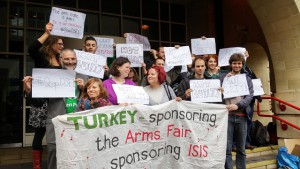Friday April 15 2016
Prior to that we had a merry time being photographed, hanging out, working out what we might do afterwards and all that type of thing.
The judge made clear that what he would be reading today was an outline of his judgement and that some of the arguments needed to be written out in more detail before he finished, but that it had the main conclusions and meant that we could finish the case today.
Before the judgement he made some comments and the very poor case management, some of which lay with the court for not providing the correct papers on time, not dealing properly with the case witness requirements etc. There should have been a pre-trial review 4-6 weeks before the hearing to ensure that everything was in place, and what was not already in place would be. The prosecution was at fault for failing to provide what was requested at discovery, for providing a skeleton argument for a defence that was not being put instead of the defences that were being put, for not telling the court that they needed to play CCTV so the hearing could be scheduled in the correct court and for not ensuring that they could play the videos in the court (one of the defence team had to use their computer to play the prosecution videos – but then they were helpful to us). He also said Ms Daly commendable but not as detailed or coherent as he would wish in her arguments. He was annoyed with the defence for failing to return to court when the prosecution did not hand over items in discovery, for late delivery of exhibits and skeleton arguments and producing evidence during the trial. In particular, he mentioned the map showing the road is a private road without having shared it with the court or prosecution in advance and then the prosecution for introducing photos conceding the point the following day, with the result that the question of whether it is a private road was not properly explored.
Finally, he criticised the Crown Prosecution Service for not providing Ms Daly with any support when she was against four briefs and a defendant in person and there was so much later material.
In short it was only by luck that we finished in accordance with the timetable, not good case management.
Next he turned to the question of whether he should consider our other defences even if he were to acquit us on the grounds of prevention of crime, and ruled that he did not have to; in part as it would probably make little difference as to whether there was an appeal.
He pointed out there were four defences that were being offered, and the prosecution would have to show that they all failed, that is the prosecution would have to show that we were:
1. Not acting to prevent a crime;
2. Unreasonable – that is the nature of alleged obstruction was not reasonable in terms of our rights under articles (9), 10 and 11 of the European Convention on Human Rights;
3. In the cases of Lisa Butler and Susannah Mengesha whether they were on a highway, as the prosecution agreed that it was a private road;
4. Causing an obstruction or as we claimed vehicles were able to move around us.
His judgement only addresses the first question, of prevention of crime.
Section 3 of the Criminal Law Act 1967 states a person may use such force as is reasonable and that a person’s belief must be accepted subjectively, and it must be assumed that the crime would happen without a successful intervention so long as the defendant honestly believes that the crime would occur and that the force used was reasonable.
It is important to take into account the degree of the evil to be prevented and what other possible action might be used to prevent it. Section 76 of the Criminal Justice Act 2008 is only directly concerned with force against the person. Ms Daly claimed we were not using force and therefore the section is not applicable; and therefore would need to rely self-help which only available in most limited circumstances, as these activities are normally reserved to the police, armed forces etc. One is normally expected to call in the police and not take law into one’s own hands. The Law takes deepest suspicion of self-help.
The prosecutor also referred to failure of the action, which was foreseeable and therefore to illegitimate and might open the floodgates to any action against anything.
Mr Payter dealt with the point commendably – force need not be against the person. If it is lawful to use force, then it would be very peculiar if one was not allowed to use less. The law is a partial codification, not a complete codification. The judge prefers Mr Payter’s analysis and therefore it does not preclude a section 3 or common law defence.
When it came to self-help the judge said that there was clear evidence of unlawful action which was not challenged by prosecution. As a result, there was a compelling inference that similar crimes were occurring at DSEI 2015. Further, there was clear and compelling evidence that the authorities were taking no action, and those who complained were not taken seriously.
As to inconvenience. He could not accept that collateral inconvenience renders it illegitimate and no sources were cited by Ms Daly to suggest other. The judge argued that failure cannot make it illegitimate or a frail elderly person who ineffectually grabs a thief’s arm could be prosecuted for assault whilst someone who punched the thief could not.
Finally, he accepted Mr Payter’s three stage test, and that it applies to all eight defendants. That is the prosecution need to show that:
1. We did not intend to prevent a crime;
2. We did not believe the force we used was necessary;
3. The force that we used was not reasonable.
He was not sure on any of these questions and therefore he had to decide for defendants. We were free to go.
He also made an award of costs on our behalf.
There was cheering in court, and much celebration outside.
• The Guardian: Court dismisses charges against London arms fair protesters
• The Independent: Protesters who blockaded London arms trade fair acquitted after judge sees evidence of illegal weapons on sale
• Hampstead and Highate Express: Eight acquitted including former Chairman of Camden Greens as Judge accepts they were trying to prevent illegal arms dealing at DSEI fair
• Campaigners Cleared Over Arms Fair Protest Against Sales To Authoritarian Regimes
and to sign up to stop the next DSEI arms fair in 2017
Posted by Tom at 11:23 pm No comments: Links to this post
Email This Blog This!Share to TwitterShare to FacebookShare to Pinterest
Recommend this on Google
Labels: peace, stopDSEI, trial




